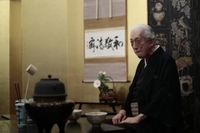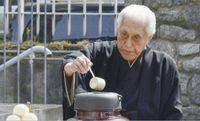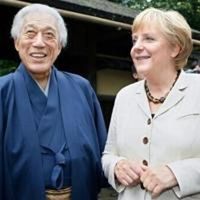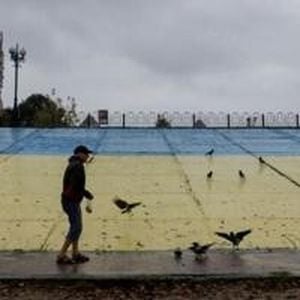Genshitsu Sen, the esteemed Japanese tea master and former Kamikaze pilot trainee, passed away on August 14, 2025, at the remarkable age of 102. His death marks the end of an era for the world of Japanese traditional arts, as well as for the global peace movement he so tirelessly championed. According to officials from the Urasenke school, Sen had been hospitalized since May 2025 after a fall left him with difficulty walking, and he died early Thursday after developing breathing trouble. His passing was met with tributes from across the globe, a testament to the far-reaching influence of a man who dedicated his life to the philosophy of "peacefulness through a bowl of tea."
Born in 1923 in Kyoto, Japan's ancient capital, Genshitsu Sen was destined for a life steeped in tradition. As the eldest son of the 14th head of the Urasenke school, one of the three major schools of Japanese tea ceremony, Sen began his training at the tender age of six. The family's lineage traces back to Sen no Rikyu, the 16th-century tea master who shaped the principles of Chado, or "the way of tea," and the "wabi" aesthetic that prizes simplicity and tranquility. This heritage would come to define Sen's mission in life, but not before he faced the harrowing uncertainties of war.
In 1941, the same year he entered Doshisha University in Kyoto, Sen's life took a dramatic turn as Japan launched its war on the United States. Just two years later, he was among the 100,000 students mobilized for military service. Recruited into the Imperial Japanese Navy in 1943, Sen was trained to be a Kamikaze pilot as part of Japan's desperate suicide attack program during World War II. While he never received the order to embark on a one-way mission—Japan's defeat came before he was deployed—Sen saw many of his fellow trainees depart for their final flights. The trauma and loss he witnessed during this period would forever shape his worldview.
Sen's wartime experience became the wellspring of his lifelong advocacy for peace. As reported by the Associated Press, he once reflected, "Serving tea brings peace to everyone. If everyone feels peaceful, there will be no war." He famously brought his tea ceremony implements with him during his naval service and performed a farewell tea for a group of Kamikaze trainees before their doomed mission. This act, blending tradition with the stark realities of war, foreshadowed his later efforts to use the tea ceremony as a bridge between cultures and a balm for the wounds of conflict.
After the war, Sen wasted no time in turning his personal philosophy into action. In 1951, he traveled to the United States to introduce the Japanese tea ceremony to a wider audience. His mission was simple yet profound: to promote global peace through the art of tea. He became the 15th Grand Master of the Urasenke school in 1964, following his father's death, and would lead the school for nearly 40 years, passing the mantle to his son in 2002. Even after stepping down, Sen remained an active ambassador for Chado, continuing to travel, teach, and perform ceremonies well into his later years.
Sen's efforts were nothing short of extraordinary. He performed the tea ceremony more than 300 times in 70 countries, according to Urasenke officials, earning him the affectionate nickname "the flying teamaster." He visited more than 60 countries, lectured at universities such as the University of Hawaii, and established educational institutions dedicated to tea ceremony in places like China. His international reach brought him face-to-face with some of the world's most influential figures. He served tea to Queen Elizabeth II, U.S. President George W. Bush, Myanmar's Aung San Suu Kyi, and even performed a ritual tea ceremony at the Vatican, where he had an audience with Pope John Paul II. After a meeting with Chinese statesman Deng Xiaoping, Sen helped establish a tea ceremony school in China, further cementing his role as a cultural bridge-builder.
One of Sen's most poignant acts of reconciliation came in 2011, when he served tea at the USS Arizona memorial in Honolulu, Hawaii, on December 7—the anniversary of the Japanese attack on Pearl Harbor. The ceremony was a tribute to those who lost their lives on both sides of the conflict, and a powerful gesture of healing and remembrance. As reported by Kyodo News, Sen hosted tea ceremonies to pray for peace during milestone anniversaries marking the end of World War II, always mindful of the lessons history had taught him.
Sen's contributions were widely recognized both in Japan and abroad. In 1997, he became the first figure from the world of tea ceremony to receive the prestigious Order of Culture from the Japanese government, honoring his efforts to modernize and popularize the tradition. France awarded him the Legion of Honor, in the rank of commander, in 2020. He also served as a UNESCO goodwill ambassador and as a special assistant to the Japanese foreign minister, roles that allowed him to further his mission of cultural diplomacy.
Through his tireless work, Sen helped transform the Urasenke school into a global institution. According to the school, it now boasts 167 chapters and branches in Japan and around the world, a testament to the enduring appeal of Chado and the power of Sen's message. He taught tea ceremony classes at universities abroad and inspired generations of students to see the ritual not just as an aesthetic pursuit, but as a way to foster understanding and peace.
Sen's passing was marked by quiet dignity. Urasenke officials announced that his wake and funeral would be held privately by close family, with a memorial service planned for a later date. Even in death, Sen's legacy continues to inspire. As the world grapples with conflict and division, his simple yet profound philosophy—"peacefulness through a bowl of tea"—reminds us of the transformative power of tradition, hospitality, and human connection.
Genshitsu Sen's life serves as a bridge between Japan's turbulent past and its hopes for a more peaceful, interconnected future. In a century marked by both unimaginable violence and remarkable reconciliation, he stood as a quiet yet powerful advocate for peace, one cup of tea at a time.






